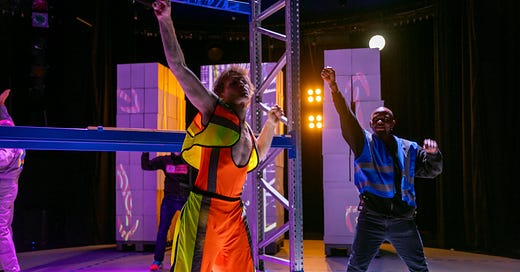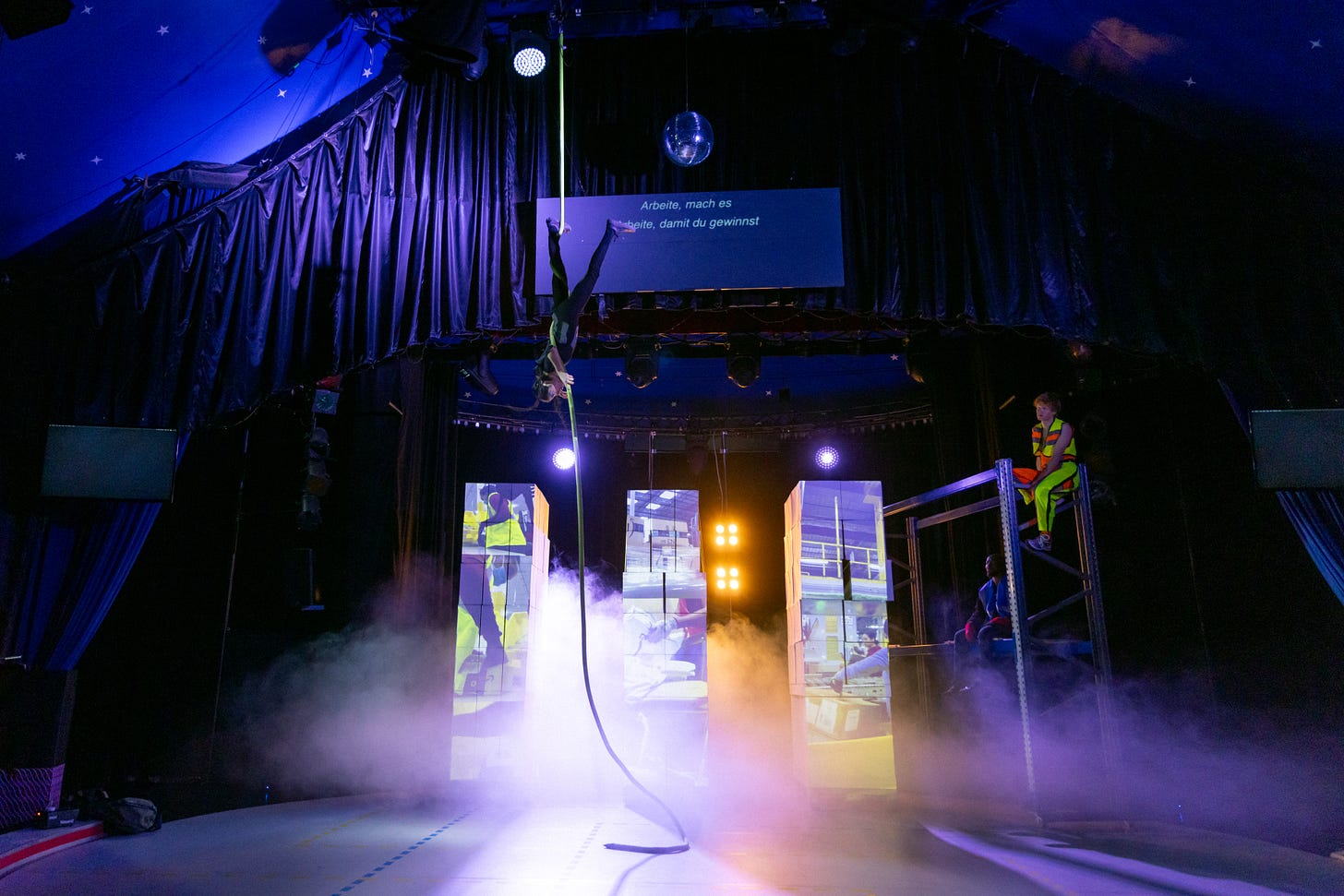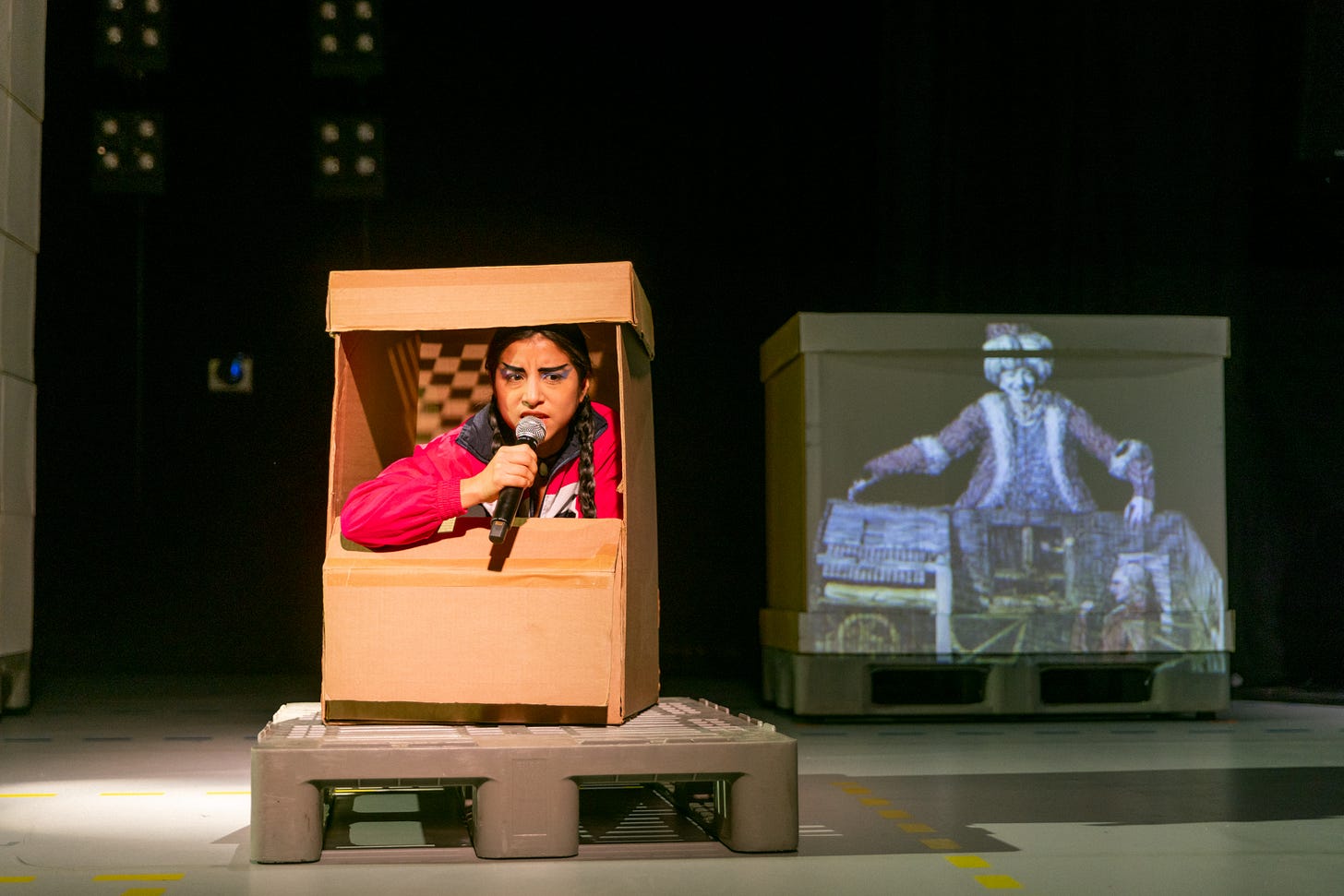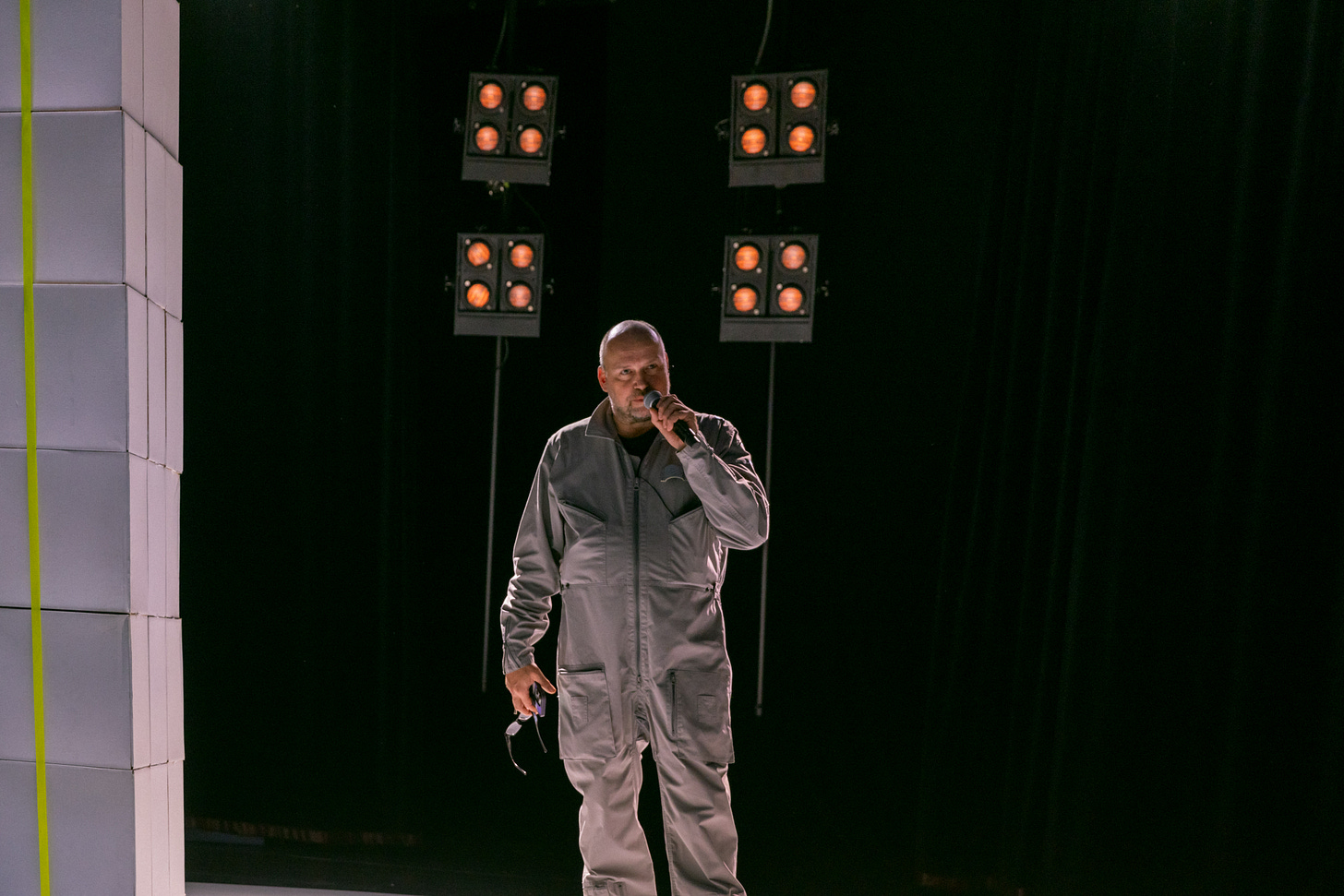Nights at the circus: Rimini Protokoll's la danse d'amazon and an interview with Daniel Wetzel
On a new circus show exploring the inner workings of Amazon.
Welcome to Café Europa, a weekly newsletter dedicated to European theatre.
This week we’re staying in Berlin to discuss the new show by German collective Rimini Protokoll, la danse d’amazon. I’ve previously interviewed Rimini Protokoll’s Helgard Haug, about All Right. Good Night, and Stefan Kaegi about Uncanny Valley, both for the Guardian, and while I was in Berlin I had the opportunity to talk to third member, Daniel Wetzel, over coffee in Kreuzberg, more of which below.
If you enjoy reading this newsletter, then please consider sharing it with friends or colleagues or anyone who might find it useful. And, if you can, please consider becoming a paid supporter, it really makes a difference and will allow me to expand my coverage. I’ll also be introducing bonus editions for subscribers in the new year. As is the way these days, I also have a Ko-fi account, if you want to keep me caffeinated.
The frog chorus
A little tin clicker in the shape of a frog sits on every seat. You can buy these little green guys on Amazon.de. They are shiny and make a clacking noise when you press them, something the audience is encouraged to do throughout Rimini Protokoll’s new show. Created and hosted by Daniel Wetzel, la danse d’amazon takes place in a circus tent and attempts to use the medium of circus to talk about the tech megalodon that is Amazon.
Because the space, Cabuwazi Marzahn, is a working circus school during the day, we get an introductory sequence in which a group of young performers present an energetic skipping rope routine before the show turns its attention to Amazon, the company formerly called Cadabra that has grown to become the second largest private employer in the US. Jeff Bezos initially wanted to call his company Relentless, but he settled on naming it after the biggest river system in the world.
It is a company with its own mythology, a company that shapes what and how we consume, and Wetzel – with the approach to research that Rimini Protokoll bring to so much of their work – wanted to understand it from the inside. One of the initial ideas was to dispatch performers to Amazon fulfilment centres in boxes and have them put on a show for employees. This was soon discarded. Instead, he connected with two young circus performers, Laleshka Salas Salazar and Basile Herrmann Philipe, the idea being that they would take jobs within Amazon and explore their experiences. Salazar works briefly for Amazon’s crowdsourcing platform Mechanical Turk (named for an 18th century chess playing automaton) in which small tasks that cannot be done by machines - called HITS (Human Intelligence Tasks) - are farmed out to freelancers, jobs like content writing or image tagging. Philipe eventually baulks at the idea of working in a fulfilment centre, but his resistance is incorporated into the show.
It has the kind of structure that allows for this. Just like in a circus, a series of people present their special skill or area of expertise to the audience. Wetzel has assembled a troupe of people either employed by Amazon or who work in businesses associated with Amazon. Monsur Babalola, for example, trained as a psychologist but now works at Amazon Fresh. We also meet Jana Krekić who runs YLT, a translation business designed to aid Amazon sellers in honing search terms for different international markets. She gives us a short presentation, explaining the nature of her job. While this is going on, Salazar and Philipe clamber over a set of metal shelves in the middle of the stage or perform aerial rope routines. At the end of each segment, the audience uses their little metal clickers to show their appreciation.
Wetzel later tells me that of the hundred of pages of research he gathered on Amazon, only a handful make it into the show. Despite this it still feels pretty stuffed. Wetzel tells us about Amazon Web Services, its cloud computing and storage arm, which generates the majority of its profits. He explains how Amazon actively recruits from the military, while at the same time being one of the main employees of refugee workers. He talks about the concept data lakes. He discusses working conditions at the warehouses, sorry, ‘fulfilment centres’ and some of the misconceptions about how these places operate. He asks Babalola about his own experiences, both as an Amazon employee and a psychologist.
At the same time as the show is being performed, Peng! Collective, a Berlin based anti-consumerist group are staging their own intervention, creating a website Ähmazon | Peng – where employees and customers can turn whistleblower and log poor workplace practice. Wetzel also points out that for many the experience is not universally negative, that many workers experience dignity and feel invested in their work, some even consider it a kind of family.
All of this is interwoven with the story of polar bear trainer Ursula Böttcher, a circus star of the GDR, as related by Gisela and Dietmar Winkler, a pair of circus historians seated on a throne of books. This digression later provides the basis for two of the show’s most teasing, pleasing moments.
At one point, entrepreneur Sebastian Herz explains to Salazar that she is missing a trick by just performing daring rope stunts, she should look at merchandise and branding. They start to discuss the best way to source and sell an aerial rope on Amazon. They contact Chinese factories to see who can supply the best product. Jana Krekić advises them on how to list it on Amazon.
This is not a polemical show, rather it feels like a piece designed to help its audience better understand this vast organisation and the role it plays in our lives. Amusingly Wetzel’s daughter even appears to critique his own Amazon buying habits and wryly describe the growing tide of Amazon packages that arrived at their house during the period he was researching the show.
The version we see feels a bit scrappy and unfinished but in a very endearing way. It is a show intended to sow seeds of thought. At some point midway through the show, snow starts to fall on the roof of the tent and the sudden drumming combines with that of the little tin clickers, creating an unexpected but rather wonderful percussive effect.
A Joycean journey - Ulysses: European Odyssey
The show was part of the massively ambitious Ulysses: European Odyssey project. Launched in 2022 to mark the centenary of the publication of James Joyce’s novel and curated by Seán Doran and Liam Browne of Arts Over Borders, the Europe-wide project spans 18 cities, with artists creating work in response to different sections of the novel. (You can read more about this project in more detail in this piece in The Stage).
In addition to artistic events, the project also includes symposiums, cultural exchange residencies for emerging artists, and the creation of a Europe-Ulysses book which will feature contributions from writers in each city.
The Rimini Protokoll show takes its inspiration from the seventh episode of Ulysses, Aeolus, which takes place in a newspaper office. (This article is really good at exploring the Homeric parallels). The Berlin chapter of the project also consisted of a symposium on the themes in Wetzel’s show which took place back in June.
While in Berlin I got to meet some of the other artists and makers involved. I was particularly sorry to have missed the Romanian section of the project, which took place in Cluj-Napoca in July. (In Between) Homes, conceived and directed by Andreea Iacob and produced by Create.Act.Enjoy, used the Sirens section of Ulysses to tell a story of migration, of the people who leave their home countries to find work, often leaving parents and sometimes children behind, finding themselves torn between countries, between homes. The show took the form of a promenade through the historic Fabrica Clujana shoe factory, a building that had only recently provided employment for many, including Iacob’s grandmother. The space was divided into rooms and each room told a story of someone who left Romania to find work and the family or lover left behind.
“We're feeding systems that learn day by day” - an interview with Daniel Wetzel
La danse d’amazon marks the first time a member of Rimini Protokoll has appeared in one of their performances. What prompted him to go on stage? It comes down to form. Given the show features a line-up of circus artists and people from the business world, he didn’t want to mark himself apart form the participants. “Let us be on the same side,” he says.
Coming into the project he also knew very little about circus, but the opportunity to learn, to explore the possibilities of a new theatre form, excited him. The initial concept for the show was for the two circus performers to take jobs at Amazon and to explore “how the experience of industrialised work modifies the circus artist.” When one of the performers declined to go through with this, Wetzel incorporated his response into the show. It tells us something about Amazon, after all, and our perceptions of it.
Ursula le Guin’s Carrier Bag Theory of Fiction has, says Wetzel, really informed his thinking when it comes to approaching “these narratives of heroic capitalism.” This is not just a way of thinking about fiction, but also about history, about humanity. Instead of the spear and the arrow being viewed as the first human tools, it could be said that it is the vessel, the container which allowed people to store things, to gather and share as well as hunt. A novel can be thought of us such a container, le Guin wrote and this idea of “non-arrow narratives” clearly excites Wetzel.
Rimini Protokoll was formed in 2000 by Wetzel, Helgard Haug, and Stefan Kaegi. Over the years they have created theatre pieces, installations, radio plays, audio walks and other work, much of which uses technology in playful and inventive ways. Kaegi built a life-sized robot of German author Thomas Melle for Uncanny Valley. Conference of the Absent is designed to be performed by volunteers from the audience. Some of their projects feel more personal and individual – Haug’s All Right. Good Night explored her father’s descent into dementia - others more collaborative. How does collective operate?
“There's nobody in the world from whom I have learned so much,” says Wetzel. “And it's a mutual process,” he adds. “We're actually always in the process of developing things together.” Haug and Kaegi both advised Wetzel in the creation of this show. “They support me very much,” he says. The collective are constantly learning from one another. “That's the core of our mutual feedback process.”
The show springs a little trick on its audience, playing with the idea of truth, myth and origin in relation to Jeff Bezos and Amazon. “I think truth is getting stronger and stronger. And fake is getting less, but we always have the opposite notion.” Just think about the Catholic church and their propaganda, he says by way of example. “Hell and everything. It’s all fake, pure fake.”
Data services make up a huge part of Amazon’s business model, says Wetzel, describing the Amazon Snowmobiles capable of storing and transporting 100 petabytes of data. Every day more and more data about us is being accumulated. “We're feeding systems that learn day by day,” he says. But, as with everything he sees in this a potential to learn. Could this date be used to the benefit humanity?
“Europe destroys so much food on a daily basis that the rest of the world could be eating,” he says by way of example. AI could be used to address this in a way no human could. “I think it's really great we are building this knowledge base,” he says.
This week in European theatre
Talking About the Fire - Chris Thorpe’s latest solo show, a China Plate and Staatstheater Mainz co-production, invites us to think about nuclear weapons. Made with the same creative team, director Claire O’Reilly and Tony-winner Rachel Chavkin, as his similarly thinky shows Status and Confirmation, it opens at London’s Royal Court on 7th December.
The Argonauts - The 2023/24 season at Slovenia’s Mladinsko Theatre continues with an adaption of American author Maggie Nelson’s auto-fictional book about pregnancy, motherhood, sexuality, and the different shapes that families can take. Michał Borczuch’s production, which also draws on research about family models in Slovenia, premieres in Ljubljana on 9th December.
Primeval and Other Times – Director Guy Cassiers and Rotterdam collective Hotel Modern, creator of miniature worlds, come together with the ITA ensemble to present Olga Tokarczuk’s exploration of life in a Polish village using models and video screens. It opens in Amsterdam on 10th December.
Thanks for reading!
If you have any feedback, tips, thoughts or other comments you can reach me on natasha.tripney@gmail.com







